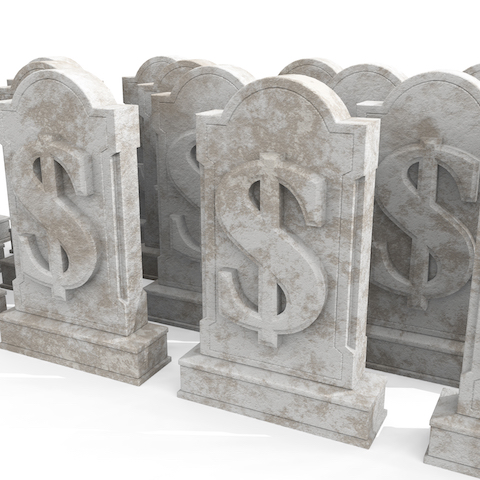What Happens To Your Debt After Death?

We humans spend an inordinate amount of our lives worrying about death.
Increasingly, Americans are concerned financially about their families after their demise.
According to the Federal Reserve, leaving your family with big bills could be more of a problem now than ever: household debt recently hit a record high of $13.29 trillion.
*** SPECIAL NOTE *** – If your credit cards, personal loans, or medical debts have become unmanageable and you owe over $20,000… then go here for debt relief. We can help!
Everyone should be wondering the same question: Are debts like wedding vows—“till death do us part”—or will they haunt you and your loved ones from beyond the grave?
So What Exactly Happens To One’s Debt After They Die?
First, let’s break down the process.
Once a person has deceased, their loved ones are required to notify all creditors.
Meanwhile, a court collects all the deceased’s assets and debts into one big entity, the estate.
A procedure called probate occurs. This is when creditors have a chance to make a claim on the deceased’s assets. Once the probate period is over, whatever is left of the assets will be given to the family.
So yes, all debts that can be paid must be paid from your estate, so long as those creditors make a claim.
However, in most cases, your creditors cannot go after your family members to pay outstanding debts. But they can significantly decrease—or eliminate—the amount your loved ones receive from your estate.
How these post-mortem payments function depends on the types of debt you have, your relationships, and even where you live.
Secured Debts
Secured debts are debts that are attached to something of value, say a house or a car.
If you still owe money on your home loan, the bank can file a claim for the remaining balance.
If your estate doesn’t have enough cash to cover it, the bank can force the home to be sold and recover its money from the sale. The same goes for a car loan.
Unsecured Debts
Unsecured debts would include credit card debt, personal loans, and any other debts without some type of collateral against them.
These bills also must be paid out of the estate, but if the estate comes up short there’s nothing these creditors can do.
Credit card debt should not have to be paid for by relatives or spouses of the deceased unless they are co-signers on the loan. Creditors simply must eat the cost if there is not enough money from the estate to cover the cost.
Federal Student Loans
Federal Student Loans are a special debt category because—unlike any other personal debt—they disappear once you are deceased.
According to the U.S. Department of Education, if the borrower of the federal loan passes, the loan automatically is cancelled, and the debt is discharged by the government.
Spouses
The only complicated relationship here is your spouse.
In some cases, creditors can pursue their remaining money from the spouse of the deceased.
This boils down to whether you live in a Common Law or Community Property state.
In most states, a person’s debts are theirs alone and—unless both partners are listed—those debts do not belong to their spouse.
However, in Community Property states (Arizona, California, Idaho, Louisiana, Nevada, New Mexico, Texas, Washington, Wisconsin, Puerto Rico, and [kind of] Alaska), spouses are treated as a unit in all matters, including debt.
So yes, your estate can be raided by your creditors.
But no, for the most part your loved ones are safe.
When it’s all said and done though, the best way to secure your family’s future is to leave this world with as little debt as possible!
At Americor, we understand the unique financial challenges people are facing today.
As America’s trusted source for debt relief solutions, we aim to empower you with financial knowledge that can lead to informed decisions, whether it’s about savings, investments, or managing debt.
If your debt has become unmanageable and you have difficulty making your debt payments each month, then you should consider a FREE consultation call with one of our certified Debt Consultants, who can provide personalized debt relief advice tailored to your specific needs.
By taking proactive steps today, you can put an end to your financial stress and work towards a brighter financial future.
Remember, there is always hope for debt relief, and our team of experienced professionals are ready to guide you on your journey to regaining control of your finances.
For more information on Americor’s debt relief services, contact us today to see how we can help you eliminate your debts, and get on the fast-track to becoming completely debt-free!